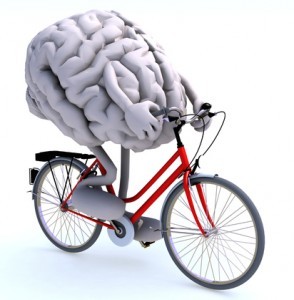Great news – Cycling improves your brain health
 I recently read an interesting article about how cycling is great for your brain health. I find this area of study quite fascinating. It seems that only 10 or 15 years ago, the learned professionals in the study of the brain were saying that our brains are relatively unchangeable and simply deteriorate as we age. Now it seems there are lots of people saying that the brain is far more malleable than we originally thought and I think it’s great news. So I’ve plagiarised the article I read and provide a summary here. I also found that undertaking a simple Google search on this topic brought up some other really interesting material.
I recently read an interesting article about how cycling is great for your brain health. I find this area of study quite fascinating. It seems that only 10 or 15 years ago, the learned professionals in the study of the brain were saying that our brains are relatively unchangeable and simply deteriorate as we age. Now it seems there are lots of people saying that the brain is far more malleable than we originally thought and I think it’s great news. So I’ve plagiarised the article I read and provide a summary here. I also found that undertaking a simple Google search on this topic brought up some other really interesting material.
Several new studies have found that cycling improves the way your brain works by making several important structures bigger so you can think faster, remember more, and feel happier.
The brain is made up of two kinds of tissues: Grey matter, which has all the synapses and is the command centre of your body, and white matter, which is the communication hub, using axons to connect the different parts of grey matter. The more white matter you have, the faster you can make important connections, so anything that increases white matter is good. A recent study from the Netherlands found that cycling does exactly that, improving both the integrity and density of white matter and speeding up connections in the brain.
White matter isn’t the only brain structure affected by cycling, however. Another study, published this year in the Journal of Diabetes Complications, found that after cycling for 12 weeks, participants gained more than just strength in their legs—they also saw a boost in brain-derived neurotrophic factor (BDNF), a protein responsible for regulating stress, mood, and memory.
You’ll not only feel mentally better after a ride, but you’ll actually be smarter. Biking, along with other types of aerobic exercise, has been shown to increase the hippocampus, one of several brain structures related to memory and learning. A study from the University of Illinois found that the hippocampus of participants grew two per cent and improved their memory and problem solving skills by 15 to 20 per cent after six months of cycling daily. Additionally, the cyclists reported a greater ability to focus and an improved attention span. To top it off, all of these perks seem to counteract the loss of brain function normally associated with ageing, with the scientists noting that the cyclists’ brains appeared two years younger than their non-exercising peers.
Most of the studies showed significant mental improvements after cyclists rode 30 minutes or less at a moderate intensity. And the results were consistent whether people rode their bikes inside or outdoors.
Stronger neural connections, a better mood, and a sharper memory—in addition to better heart health, a lower risk of diabetes, and less incidence of cancer. Why wouldn’t you ride a bike?
If you’d like to read the original article I’ve borrowed from, you’ll find it here.
It’s great to know that my favourite activity is good for my brain as well as the rest of my physical health. I plan to keep cycling until I can’t get on my bike any more, and that certainly won’t be any time soon.
